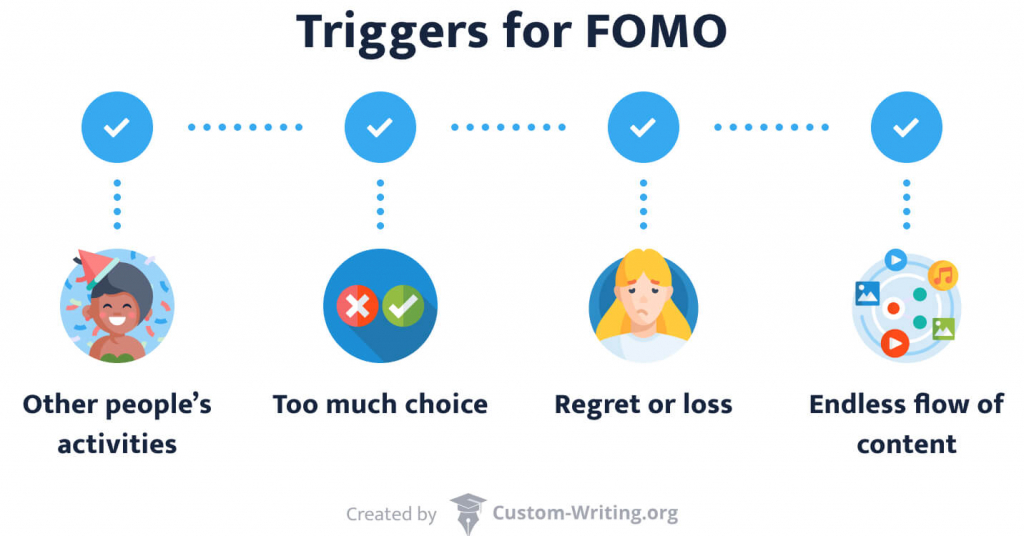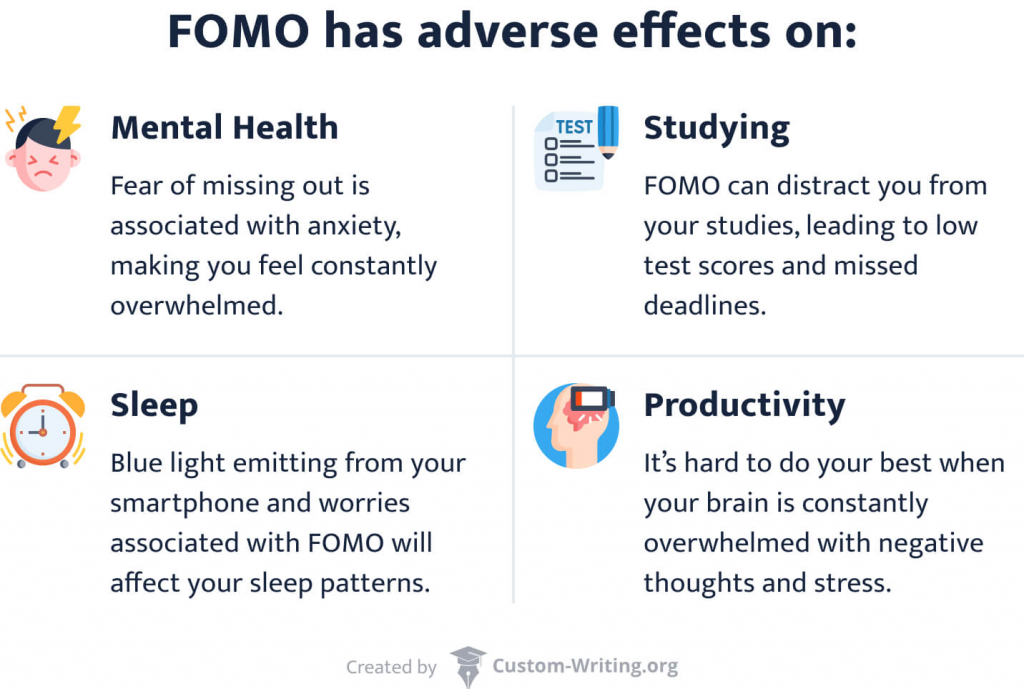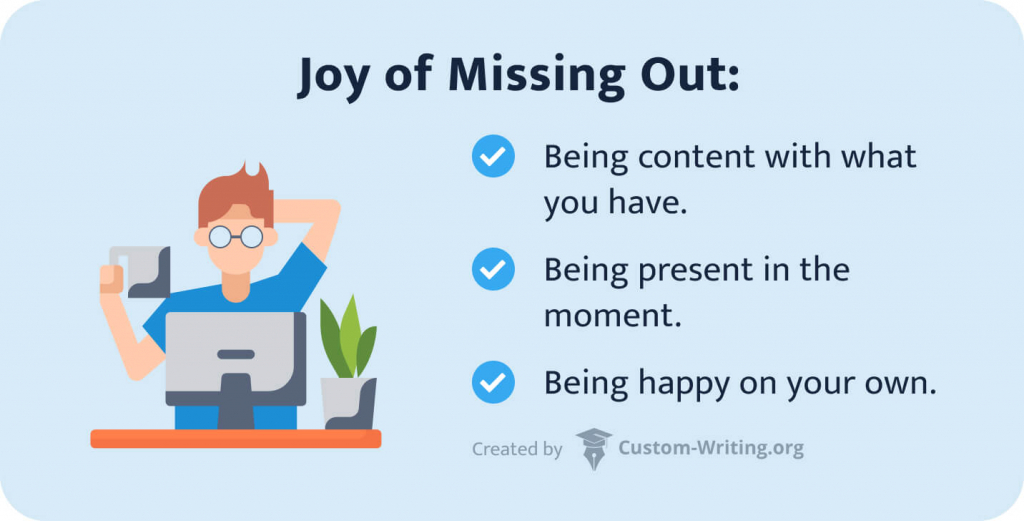Partying with your buddies, checking out an art exhibition, catching the new episode of the hottest show—what do these things have in common? They are activities you probably don’t want to miss out on.

If thinking about not doing these things is unbearable, you may be experiencing FOMO: the fear of missing out. FOMO can cause significant stress, especially if a person is susceptible to anxiety or depression.
Want to know how to cope with it? You’re in luck!
In this article, our custom-writing experts will clarify how to understand if you have FOMO and teach you how to get rid of it.
🤔 What Is FOMO?
FOMO is something that many of us have undergone but didn’t have a name for until recently. Simply put, it is the anxiety at the prospect of missing out on something thrilling that other people do, know, or have. It may be some activity you want to participate in, an opportunity you’ve overlooked, or something everyone has but you don’t.
Young people are especially prone to getting FOMO. We’ll look at its various reasons shortly, but in general, the more likely a person is to be glued to their phone, the more inclined they are to experience FOMO.
🔍 Why Does FOMO Happen?
FOMO is a somewhat new phenomenon. The term was created in 2004 and eventually found its way into dictionaries. Naturally, it doesn’t mean that humans never felt something like FOMO before 2004, but, most likely, it was on a smaller scale and for other reasons.
An injured hunter-gatherer may have felt sad at the sight of his friends going on a hunt without him 13,000 years ago. But did he then spend days thinking of the fun they were having and all the missed opportunities for selfies? That’s unlikely.
Regardless of the history of FOMO, things have been escalating quickly in the last two decades. Now more than ever, people respond strongly to the thought of being excluded. These days, FOMO is taken seriously by mental health practitioners across the globe.

Let’s dive a little deeper into the most prevalent triggers for FOMO:
📌 Other people’s ventures.
Thanks to smartphones and social media, we almost always know what everyone else is doing. Aside from these trivial details taking up invaluable storage in our memory, it has another downside—it makes us ask, “Am I missing out by not doing the same?”
📌 Too much choice.
“I want it all, and I want it now,” sang Freddie Mercury. It’s the same for us, but alas, it’s impossible. We have to pick one thing over another, which inevitably makes us doubt if we’re missing out on the other option.
📌 Regret or loss.
When our decisions backfire, we wonder what we should’ve done instead. These questions trigger the fear of having made the wrong choice.
📌 An endless flow of content.
We are constantly bombarded with information about other people’s lives and infinite options to select from. Unfortunately, not being addicted to social media doesn’t mean you’re immune to FOMO. Instagram-resistant people can also fall victim to this danger.
How FOMO Is Used in Marketing
It would be strange if no one seized the opportunity to turn FOMO into a money-making tool. Turns out, our fears are surprisingly effective at encouraging us to give our money away.
Open your Instagram feed, and you’ll most likely see amazing products used by beautiful people in unrealistic situations. Why wouldn’t you buy something that will (allegedly) make you happier and bring your life closer to perfection? Unfortunately, even if you buy it, it probably won’t make you feel any better.
Who Usually Gets FOMO
We all may have felt a little FOMO here and there, but some people are more prone to it than others. They are the types who ask themselves, “Why am I not doing what they’re doing?” more often than necessary. Let’s see who exactly is most susceptible to FOMO:
- Social extroverts.
These people are at their best in social situations. It’s only natural for them to feel isolated when they see others engaging in activities they’re not a part of. Social interaction is their energy source, so missing an opportunity to be part of the action may feel depressing. - Socially anxious people.
Although a person with social anxiety generally tries to avoid being surrounded by people, they may also experience FOMO. And it’s not that surprising: loneliness and low confidence are definite triggers for fear of missing out. Psychologists believe that socially anxious people may actually want to miss out, but at the same time, they wish to feel included. - People who experienced emotional trauma.
Being traumatized emotionally makes it easy for people to fall prey to all kinds of fears, including FOMO. When a person wants to establish healthy relationships but fails, watching someone else do it intensifies the feeling of being left out.
🔬 How to Recognize FOMO: 10 Signs
You may not even realize that the uneasy feeling weighing you down is FOMO. A great way to check is to ask yourself the following 10 questions. The more positive answers you give, the more likely you are to have FOMO.
- Do you say “yes” to everything?
When someone suggests you do something, do you consent without doubts? While it minimizes your chances of missing out, it may also reduce your quality of life. - Do you feel left out when you don’t participate in something?
Maybe you couldn’t attend an event, weren’t invited to a party, or weren’t told about some new trend—whatever the cause, it makes you feel like an outcast. - Are you unsatisfied with your life?
It’s no surprise that experiencing FOMO makes people feel miserable. After all, missing out on something makes you think your life is not as dynamic as it could be. - Are you on social media non-stop?
There’s a reason some of us just can’t put our phones down. What if we miss information that could lead to a fascinating experience or a splendid opportunity? The truth is, it’s much more likely that the only thing it will lead to is another episode of FOMO. - Do you live your life at high speed?
A person with FOMO is persistently seeking new things to do because it makes them feel like they’re busy and not missing out on anything. - Do you want to be on trend all the time?
Do you find yourself suddenly obsessed with one thing and then quickly moving on to the next thing you saw online? Yes, this could also be a sign of FOMO. These new hobbies and activities are trendy and can create the feeling that you belong to a group. - Do you care what other people think?
Most of us tend to second-guess our choices and feel insecure about certain aspects of our lives. If this second-guessing is based on other people’s judgment, it may be a symptom of FOMO. - Do you always want to be around people?
FOMO can result from the wish to be surrounded by friends or just any people. If you need to always be in the thick of things, you might be more predisposed to FOMO. - Do you neglect your health?
“I feel thin, sort of stretched, like butter scraped over too much bread,” said Bilbo Baggins. This might be a spot-on description for someone with FOMO, experiencing exhaustion, poor or insufficient sleep, and stress. - Are you prone to distracted driving?
Not a sign you’d think of on your own, but it’s a real one! The study on FOMO published in the journal Computers in Human Behavior highlighted distracted driving as one of its key findings.
Effects & Dangers of FOMO
They wouldn’t call a good thing a fear, right? Clearly, FOMO comes with many more negative side effects than positive ones. Let’s take a better look at them and see how they might be interfering with students’ wellbeing.

💭 Mental health
Fear is primarily associated with anxiety. A person with FOMO is constantly overwhelmed by this uncomfortable feeling and struggles to find their feet in an ever-changing reality. Social media FOMO pushes them to refresh their feeds in hopes of news, updates, and likes.
📚 Studying
FOMO will inevitably distract you from what must be done. You can quickly lose yourself in all the other things you could do, places you could go to, people you could talk to, and news you could catch up on. As a result, you do worse and worse on tests and start missing assignment deadlines.
💤 Sleep
You may not be losing sleep over missed opportunities, but you’re definitely losing it because of your smartphone. Let us explain. Blue light emitted by smartphone screens is messing with your melatonin—the hormone responsible for sleep. So, if you have a habit of staring at your smartphone before bedtime, which you probably do if you have FOMO, you may have trouble falling asleep.
⚙️ Productivity
When you’re stressed and not sleeping enough, you can’t expect your productivity to be at its peak. Even if you can sit down and study, you may not be able to pay attention because your brain will still be overwhelmed by stress hormones, random thoughts, and exhaustion.
💪 12 Tips on How to Deal with FOMO
We understand that knowing how to get over FOMO in college is especially important. Students, in particular, are prone to developing FOMO, which can negatively affect their college years. That’s why we’ve put together this list of excellent behavioral strategies to help you deal with this fear by developing productive habits.
- Do a digital detox. Smartphones play a huge role in developing FOMO. In turn, FOMO makes you want to use your smartphone more. It’s a vicious cycle, so why not break it by setting a time period in which you avoid your smartphone altogether?
- Spend more quality time with friends and family. When you’re surrounded by your loved ones, you may realize that you don’t spend as much time thinking your choices and missed opportunities.
- Try journaling and recording fun experiences. You can write down what makes you feel good and at peace with yourself. Whenever you feel FOMO approaching, open your diary and remind yourself of the good and meaningful things in your life.
- Find out what triggers your FOMO and learn to avoid those things. Recording your experiences can help you understand what triggers your FOMO. Are you especially prone to this feeling after going on Instagram? Then change your feed to see less of the content that triggers you. Do you feel worse after talking to that person you know who always blabbers about their exciting life? Try engaging with them less.
- Use nudges to remind yourself about FOMO-based patterns. For example, turn off your smartphone notifications that are non-essential but are known to trigger your FOMO. If you want to focus on your assignment or read a book for pleasure, keep your phone out of reach while doing so. Interestingly, if you change your smartphone display to greyscale, you’ll be less inclined to look at it.
- Avoid agreeing to things just because you’re afraid of missing out. Take a more mindful approach to choosing your activities. Decide if you really want to do something or if you simply don’t want to miss out.
- Treat yourself. Sometimes doing something nice for yourself is all it takes to alleviate the symptoms of FOMO or any other condition that’s bothering you. Try it out!
- Set boundaries and rules for yourself. You can time your phone usage, tell yourself that you won’t agree to more than one event a week, prioritize academic assignments over social gatherings, and find ways to reward yourself for those advances.
- Work out or do yoga. Sports are awesome. They take your mind off what’s making you sad or nervous and flood your brain with endorphins—hormones that make you feel good.
- Avoid using your phone after going to bed. Aside from the adverse effects of blue light, engaging with your phone stimulates your mind, giving it more potentially FOMO-triggering information to process.
- Set time limits for social media websites and apps. Website Blocker for Chrome, Space for Android, RescueTime for Windows, or SelfControl for Mac were all created to help you get your phone addiction and FOMO-triggering behaviors under control.
- Embrace the joy of missing out. Keep on reading to see how to do that.
🌱 How to Turn FOMO into JOMO
If there’s a disease, there must be a cure. The cure for FOMO is JOMO, or the joy of missing out.

Yes, you heard it right! To stop constantly comparing your life to other people’s, you need to start enjoying not being part of an activity, canceling unnecessary plans, and spending time with yourself—for example, in the company of a good book.
This may sound impossible to do if you’re constantly consumed by the desire to know everything and be everywhere. Yet, there are ways to get that desperate feeling under control. Let’s take a look.
12 Habits That Increase JOMO
JOMO is more than just becoming one with your pajamas. It is a mindset. To develop it, you need to know what cognitive strategies to use to change your thinking.
But worry not: we have an awesome list of these strategies right here!
- Practice meditation and mindfulness. Since FOMO implies being caught up in thoughts about what everyone’s doing, JOMO must be the opposite—being present in the moment and aware of your own experiences. Meditation will help you do just that. To begin with, try out a couple of meditation apps, such as Headspace or Healthy Minds Program.
- Change your focus to what you have instead of what you lack. We think so much about what we don’t have that we sometimes forget how lucky we are to have what we have. Have you got friends, family, the opportunity to study, a favorite book to lose yourself in, and a delicious meal three times a day? That’s much more than many people have. Don’t forget that!
- Establish real connections and meet people in person. Once you establish meaningful relationships with people in real life, you may start feeling less inclined to search for people to surround yourself with at social events and online. Let’s face it—such gatherings rarely result in life-long friendships, do they?
- Accept that it’s impossible to have everything you want. As much as social media tries to convince us otherwise, it is indeed impossible to have everything we want, and that’s okay. You can still strive for more, but make sure not to lose yourself along the way!
- Practice gratitude. Once you’ve learned to focus on what you have, you can try gratitude journaling or writing down what you’re thankful for. People who do this usually record three things they’re grateful for every day. You can reread them when you’re feeling down.
- Focus your energy on physical things. Whenever you’re doing something, make sure you are aware of your experiences. If you’re cooking, smell your food. If you’re strolling in a park, listen to the sound of the wind in the leaves. You get the idea.
- Slow down. It seems that we’re permanently in a hurry. But are we really late for anything? Ask yourself this question more often.
- Recognize that social media images are not real life. We’ve often been told that what we see online is only what we’re permitted to see. The idea of perfection is just the tip of the iceberg called “real life.” And it’s never idyllic.
- Consider the likelihood that you’re not actually missing out on anything interesting. Are you sure that whatever is going on without you is worth worrying about? We bet that usually it’s not. Take the time to ask yourself if participating in that activity is truly going to benefit you.
- Focus on one thing at a time instead of multitasking. Let yourself concentrate on what you’re doing and enjoy it. Practicing mindfulness will help fight off the compulsion to engage in a million other activities simultaneously.
- Use your senses. Perceive the world around you through sight, hearing, touch, smell, and taste, paying equal attention to each.
- Avoid social comparison. Embrace these words of wisdom: don’t compare yourself to others; compare yourself to the person you were yesterday.
🎁 Is FOMO Really That Bad?
So far, we’ve been focusing on the detrimental effects of FOMO. But what if we told you that a little fear of missing out isn’t going to hurt you? After all, it was FOMO that made our forbearers get up and move around in search of a drier cave to sleep in, bigger animals to hunt, and a better life overall.
Useful tip:
You can also improve your life through FOMO if you don’t turn it into a cause of stress but rather transform it to a source of inspiration. Try to get to the bottom of your concern and consider if it’s reasonable. Maybe a bit of good FOMO can prompt you to get out of your comfort zone, try something new, and make a tough decision.
Now that you are armed with knowledge, you can successfully cope with your FOMO and even use it to your advantage! Tell us your favorite strategy for turning FOMO into JOMO in the comment section.
🔗 References
- FOMO: How to Overcome the Fear of Missing Out: Effectiviology
- Fear of Missing Out (FOMO): Definition, Causes and Ways Out: Ionos
- How to Deal With FOMO in Your Life: Simply Psychology
- Why Do We Experience FOMO?: Discover Magazine
- What’s the Psychology Behind the Fear of Missing Out?: Slate
- 10 Ways to Avoid FOMO in College: College Magazine
- All About FOMO: Overcoming Your Fear of Missing Out: Psych Central
- 5 Ways to Turn Your FOMO to JOMO: LinkedIn
- 10 Ways Teens and College Students Can Cope With FOMO: Grown and Flown
- FOMO (Fear of Missing Out): Tech Target

![How to Get Perfect Letters of Recommendation for College [Guide]](https://custom-writing.org/blog/wp-content/uploads/2022/08/NA_SEP._14-284x153.jpg)

![How to Search the Web Effectively [For Students]](https://custom-writing.org/blog/wp-content/uploads/2022/08/hand-touching-with-search-icon-search-engine-optimisation-seo-concept-find-information-by-internet-connection-1-284x153.jpg)
![Top 25 Gadgets You Need to Study Smarter [from $20]](https://custom-writing.org/blog/wp-content/uploads/2022/06/sad-female-workaholic-keeps-hands-chin-busy-making-project-work-studies-papers-wears-elegant-white-shirt-sits-desktop-unknown-people-stretch-hands-with-notes-alarm-clock-smartphone-1-284x153.jpg)






